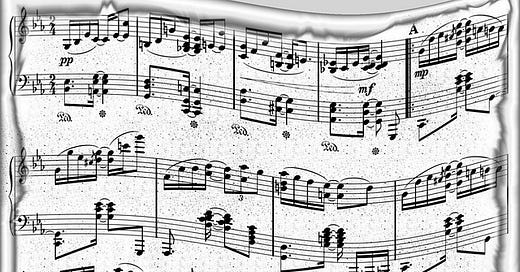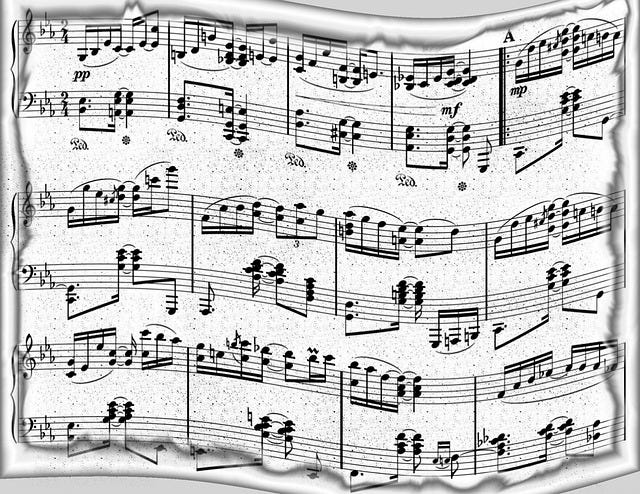This is not the information I was planning to post today. This post is in response to an article I read last week in the AARP magazine (a magazine I read cover-to-cover every month). The article was written by the magazine’s editor-in-chief, Robert Love, and was titled “You Must Remember This”. He asked, and answered, “Is there a song that takes you back—to a place, a time, a love of your life?”
He used the question to lead to the information about an AARP-sponsored study that became “The Extraordinary World of Music and the Mind” which was being featured in the December2023/January 2024 magazine.
His article reminded me that while researching vascular dementia I had seen multiple references to music therapy for various medical interventions. Many of the references mentioned dementia specifically. So, off I went down the path of checking out music therapy and dementia. What I found will end up being three or four posts on this topic during the rest of January and all of February.
Anticipating that some readers may be new to Dementia, Vascular, and perhaps new to the chaos of this evil affliction, I will start with a brief overview of dementia and its manifestations.
Causes of Dementia:
Dementia can have various underlying causes, each contributing to the complex spectrum of symptoms associated with this syndrome. Alzheimer's disease, accounting for most cases, is characterized by the accumulation of abnormal protein deposits in the brain, leading to the degeneration of nerve cells. Other common causes include vascular dementia, resulting from impaired blood flow to the brain, and Lewy body dementia, characterized by the presence of abnormal protein deposits.
Symptoms of Dementia:
Dementia manifests through a range of symptoms that progressively affect cognitive, behavioral, and functional domains. Memory loss is a hallmark symptom, often involving forgetfulness of recent events, names, and familiar faces. Cognitive decline extends to difficulties in problem-solving, decision-making, and abstract thinking.
Communication challenges arise as individuals with dementia may struggle to express themselves verbally or comprehend spoken language. Changes in behavior, personality, and mood are common, with patients exhibiting agitation, irritability, or withdrawal. The ability to perform routine activities, such as dressing or cooking, becomes increasingly compromised.
Challenges Faced by Patients:
Patients diagnosed with dementia encounter multifaceted challenges that extend beyond the cognitive realm. Memory loss, a pervasive issue, disrupts daily routines and can lead to disorientation even in familiar environments. This poses safety concerns and necessitates additional support from caregivers.
Communication difficulties contribute to frustration and isolation, as individuals may struggle to articulate their needs or understand others. Changes in behavior, often stemming from cognitive decline, can present challenges for both patients and their caregivers. Managing aggression, wandering, or sleep disturbances becomes a crucial aspect of dementia care.
Maintaining independence becomes progressively challenging as the ability to perform activities of daily living diminishes. This loss of autonomy can have profound emotional and psychological impacts, affecting the overall quality of life for individuals with dementia.
Enter MUSIC THERAPY
Music Therapy as a Therapeutic Approach for Dementia Patients
Music therapy is a promising therapeutic approach for individuals with dementia. It offers a non-pharmacological way to help you work with someone who is experiencing cognitive decline and memory impairment. This is because music therapy utilizes emotional and cognitive responses to music to engage patients in meaningful ways.
The rhythmic and melodic elements of music have been found to stimulate various areas of the brain associated with memory and emotions. Many dementia patients struggle with verbal communication and traditional forms of therapy, and music provides a different way for expression and connection.
Neuroscientific studies have revealed that music engages multiple brain regions, including those responsible for memory formation, emotion processing, and sensory perception. The repetitive nature of musical patterns can serve as a cognitive aid that helps individuals with dementia recall familiar tunes and associated memories.
Also, the emotional resonance of music can evoke memories and emotions that may be otherwise challenging to access through conventional means. Research findings also indicate improvements in memory recall, attention span, and overall cognitive abilities following music therapy interventions.
Personalized Approaches and Tailored Interventions:
One of the strengths of music therapy lies in its adaptability to the individual preferences and experiences of each dementia patient. Therapists often tailor interventions based on the patient's musical preferences, cultural background, and personal history. This personalized approach enhances the therapeutic impact by creating a more meaningful and relevant experience for the patient. This individualized approach recognizes the uniqueness of each patient and acknowledges the diversity of musical tastes and memories. This means that a patient will be more receptive to therapy that coincides with existing memories and personal emotions.
Although the comment above refers to therapists, a future post on this site will cover how you, the caregiver of a loved one in your home, can work with what you have to provide beneficial musical experiences for him or her.
Implications of Music Therapy for Quality of Life and Well-Being:
The impact of music therapy extends beyond cognitive improvements, significantly influencing the overall quality of life and emotional well-being of dementia patients. Engaging with music provides moments of joy, emotional connection, and a sense of identity for individuals who may be grappling with the challenges of cognitive decline. Furthermore, music therapy has shown potential in alleviating symptoms of anxiety and depression in dementia patients. By tapping into the emotional and expressive nature of music, therapists can create a therapeutic space that fosters positive emotions and reduces psychological distress.
Neurological Mechanisms of Music Therapy:
The effectiveness of music therapy in enhancing memory and cognitive functions in dementia patients can be attributed to its impact on the brain's neurological mechanisms. Neuroscientific research indicates that musical stimuli activate various regions of the brain associated with memory, emotion, and cognition.
The rhythmic and melodic elements of music engage the limbic system, which plays a crucial role in emotional processing and memory formation. This engagement is particularly significant for individuals with dementia, as it provides a means of accessing memories and emotions that may be otherwise challenging to retrieve through conventional methods.
Furthermore, music therapy has been shown to stimulate the release of neurotransmitters such as dopamine and serotonin, which are associated with mood regulation and cognitive functions. These neurochemical changes contribute to the overall cognitive enhancement observed in dementia patients undergoing music therapy interventions.
Emotional and Psychological Impact
Beyond its neurological effects, music therapy has a profound emotional and psychological impact on individuals with dementia. The emotional resonance of music can evoke memories, trigger positive emotions, and create a sense of connection with the past. This emotional engagement is particularly valuable in dementia care, where individuals may experience challenges in verbal communication.
The therapeutic relationship formed between the individual and the music therapist (or personal caregiver) fosters a supportive environment that encourages self-expression and emotional exploration. Music becomes a medium through which patients can communicate, reminisce, and connect with their personal histories, contributing to an improved sense of well-being.
Individualized and Person-Centered Approaches:
One of the strengths of music therapy lies in its ability to be tailored to the individual preferences and experiences of each dementia patient. Music therapists work collaboratively with patients and their caregivers to identify musical preferences, cultural influences, and significant life events that can be integrated into therapeutic interventions.
A future post will give you help in the development of a playlist.
Personalized playlists, comprising familiar and meaningful music, are created to evoke specific memories and emotions. This individualized approach recognizes the uniqueness of each patient, catering to their personal history and preferences, thereby enhancing the therapeutic impact of music.
Improving Attention and Concentration:
Music therapy interventions involve various activities, including rhythmic exercises, singing, and instrument playing, that require cognitive engagement. These activities promote improved attention and concentration in dementia patients. The structured nature of musical tasks can enhance cognitive processes such as sustained attention, focus, and the ability to follow instructions. The repetitive patterns inherent in music can serve as a cognitive aid, supporting memory recall and providing a sense of predictability for individuals with dementia. This structured engagement contributes to the overall cognitive stimulation provided by music therapy
Help on this is on the way. I promise.
Emotional Resonance of Music in Dementia Care:
The emotional resonance of music plays a pivotal role in the well-being of dementia patients. Music has the power to transcend cognitive barriers and tap into emotional memories, allowing individuals to reconnect with positive experiences from their past. This emotional connection is particularly significant in dementia care, where verbal communication may be limited, and traditional forms of interaction may become challenging.
Familiar tunes can evoke a range of emotions, from nostalgia and happiness to calmness and comfort. In the presence of joyful music, individuals with dementia often exhibit visible signs of emotional engagement, such as smiling, humming, or swaying to the rhythm. This emotional response not only enhances their immediate mood but also contributes to a more positive overall emotional state.
Holistic Approach to Dementia Care
Music therapy, as a non-pharmacological and holistic approach, aligns with the principles of person-centered care in dementia management. It goes beyond targeting specific symptoms and addresses the physical, emotional, cognitive, and social aspects of the individual.
Long-Term Cognitive Benefits
Research studies have demonstrated not only the immediate but also the long-term cognitive benefits of music therapy for individuals with dementia. Regular and sustained engagement in music therapy sessions has been associated with improvements in memory recall, executive functions, and overall cognitive abilities.
The long-lasting impact of music therapy suggests that it can be a valuable component of comprehensive dementia care programs. Integrating music therapy into the ongoing care regimen can contribute to the maintenance of cognitive function and enhance the quality of life for individuals with dementia over an extended period.
Additionally, the shared experience of music in group settings fosters a sense of community and connection among individuals with dementia. Group music therapy sessions provide opportunities for social interaction, reducing feelings of isolation and enhancing the emotional well-being of participants.
The therapeutic effects of music on memory and cognition are intricately tied to the activation of multiple brain regions. Neurological studies utilizing imaging techniques such as functional magnetic resonance imaging (fMRI) have provided insights into the intricate network involved when dementia patients engage with music.
Listening to music stimulates the auditory cortex, responsible for processing sound, and activates the hippocampus, a crucial region associated with memory formation. Additionally, the involvement of the prefrontal cortex, responsible for executive functions like attention and problem-solving, highlights the comprehensive engagement of cognitive processes during musical experiences.
Furthermore, emotional responses to music involve the amygdala and other limbic system structures, emphasizing the holistic impact of music on both cognitive and emotional domains. The simultaneous activation of these diverse brain regions forms the basis for the therapeutic potential of music in individuals with dementia. (I didn’t know all these words before I started looking into vascular dementia.)
Facilitating Neural Plasticity
Neural plasticity, the brain's ability to reorganize and form new neural connections, is a key mechanism through which music therapy exerts its therapeutic effects. In dementia patients, neural plasticity becomes particularly crucial as it provides an avenue for rewiring damaged networks and compensating for cognitive decline.
Music engages the brain in a dynamic and multi-sensory manner, requiring the coordination of auditory, visual, and motor functions. This multisensory stimulation contributes to the strengthening of existing neural connections and the formation of new ones. Through repeated exposure to music, neural plasticity is harnessed to create adaptive changes in the brain, promoting cognitive functioning and potentially slowing the progression of cognitive decline.
Impact on Memory Networks
The activation of memory networks is a central aspect of music's therapeutic effects on memory in dementia patients. The hippocampus, a region crucial for the consolidation of new memories, is particularly responsive to musical stimuli. Listening to familiar tunes can evoke memories associated with specific times, places, or emotions, tapping into the preserved memories that may be challenging to access through other means.
Music's ability to stimulate autobiographical memories, often deeply intertwined with emotional experiences, contributes to the creation of a rich and personally meaningful cognitive landscape. The engagement of memory networks not only enhances memory recall during musical experiences but can also extend to improvements in overall memory functioning over time.
Emotional and Motivational Significance
The emotional and motivational significance of music plays a pivotal role in the therapeutic effects on cognition. Emotional responses triggered by music release neurotransmitters such as dopamine, which are associated with pleasure and reward. This emotional reward system reinforces the positive experiences associated with music therapy, creating a motivational aspect that encourages continued engagement.
The emotional significance of music extends beyond the immediate session, influencing mood and emotional well-being in the broader context of dementia care. Positive emotions linked to musical experiences contribute to a more positive overall emotional state, creating an environment conducive to cognitive engagement and social interaction.
Synergy Between Music and Language Processing
Language processing, often impaired in dementia, benefits from the synergistic relationship between music and linguistic elements. Music has rhythmic and melodic patterns that mirror the structure of language. When dementia patients engage with musical activities involving singing or rhythm, it provides a structured framework that supports language processing.
The activation of language-related brain regions during musical experiences demonstrates the interconnectedness between music and language processing. This synergy can be leveraged in music therapy interventions to enhance verbal communication, allowing individuals with dementia to express themselves and connect with others through a medium that aligns with their cognitive abilities.
Implications for Therapeutic Interventions
Understanding the neurological mechanisms behind music's therapeutic effects on memory and cognition has significant implications for the development of targeted therapeutic interventions. Music therapy can be tailored to leverage specific musical elements, genres, or activities that optimize cognitive engagement and neural plasticity in individuals with dementia.
Incorporating personalized playlists, interactive singing sessions, and rhythmic exercises into regular care routines can provide ongoing cognitive stimulation. The recognition of the emotional and motivational impact of music underscores the importance of integrating music therapy as a holistic component of comprehensive dementia care programs.
The neurological mechanisms underlying music's therapeutic effects on memory and cognition highlight the dynamic interplay between music and the brain. By activating diverse brain regions, promoting neural plasticity, and tapping into emotional and motivational systems, music therapy emerges as a promising avenue for enhancing cognitive functioning in individuals with dementia. As research in this field advances, the potential for innovative and tailored music-based interventions continues to grow, offering new possibilities for improving the quality of life for those affected by cognitive decline.
.
Articles in the next few weeks will expand on the ideas in this post.




